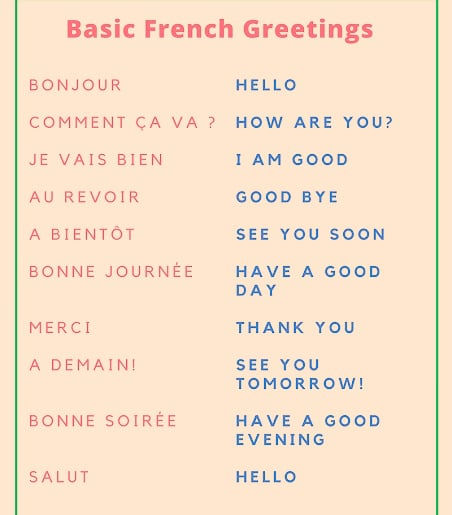Meet and Greet in French!!
- Gypsa Shrivastav
- Sep 9, 2020
- 3 min read

5 Useful French Greetings to Say Hello
1. Bonjour! – Hello! (Also, Good Morning!)
This is your basic French greeting, and it works in any setting, formal and informal alike. It’s probably the first word that most French language beginners learn, and for good reason!
Once its evening, you’ll want to replace this little pleasantry with bonsoir! (Good evening!) All in all, using either bonjour or bonsoir is your best bet for first greeting someone in either a formal or informal setting.
2. Salut! – Hi!
This is a great greeting to use with anyone you see rather often or someone you know rather well, i.e. a colleague with similar standing as you or a good friend. It is an informal greeting, and should be used as such, since it is not exactly an expression you’ll want to whip out at to begin a business meeting.
Note that the “t” on the end of the word is silent, thus following the general rule in French that if a final consonant is not followed by an “e” or other vowel, it is not pronounced.
3. Coucou! – Hey there!
This is an extremely informal way of greeting someone, so reserve this one for close friends and family, otherwise you might get a few quizzical stares. As an added tidbit, the verb phrase faire coucou (à quelqu’un) means to wave at or say hey (to someone), and is also a form of informal language.
Adding on to that, the verb phrase jouer à coucou means to play peekaboo, like a mother does with her baby. Thus, you can see the rather playful and familiar tone behind this word.
4. Quoi de neuf? – What’s up ?
While remaining informal, this is a slightly more involved greeting, in that you’re likely to glean more from the person you are speaking with than you would with the traditional bonjour. This literally means “what’s new?” and is an excellent greeting to use with a friend you haven’t spoken with in a while, with the intent of starting a conversation.
5. Allô? – Hello?
While a cognate of English, this is not used in the same capacity as bonjour, in that you cannot use it to greet people on the street. This greeting is used solely on the phone to determine whether or not someone is on the line. It can also be used ironically to get the attention of someone that hasn’t heard you, the point being that it’s as though the person wasn’t there. You probably won’t hear it used in any other situations.
5 Useful French Phrases to Say Goodbye
1. Au revoir! – Goodbye!
This expression, like bonjour, is another go-to standard salutation, usable in virtually any situation: as you leave the hair salon, as you leave the bus, as you take leave from an acquaintance, etc. Like bonjour or bonsoir, it is considered rude to not use this particular expression in public, as well as over the phone, just before hanging up.
2. À bientôt! - See you soon!
3. Je suis désolé(e), mais je dois y aller – I’m sorry, but I have to go
The main idea with this expression is its sense of urgency, and it is the je dois y aller which relays this message. The pronoun y must be used before the verb aller if no particular location is mentioned.
If you want to be more explicit and state exactly where you are going, for example I have to go to school, then the sentence would look like this: Je dois aller à l’école.
4. À plus tard! (À plus!) – (See you) later!
5. À tout à l’heure! – See you soon, See you in a while!
Take it up a notch: Désolé(e), mais je dois filer! – Sorry, but I gotta run !
This is a little phrase you can use in informal settings, for example when you have to leave a group of friends rather abruptly. The désolé(e) (sorry) renders this phrase polite so that you don’t have to worry about offending anyone.



Comments